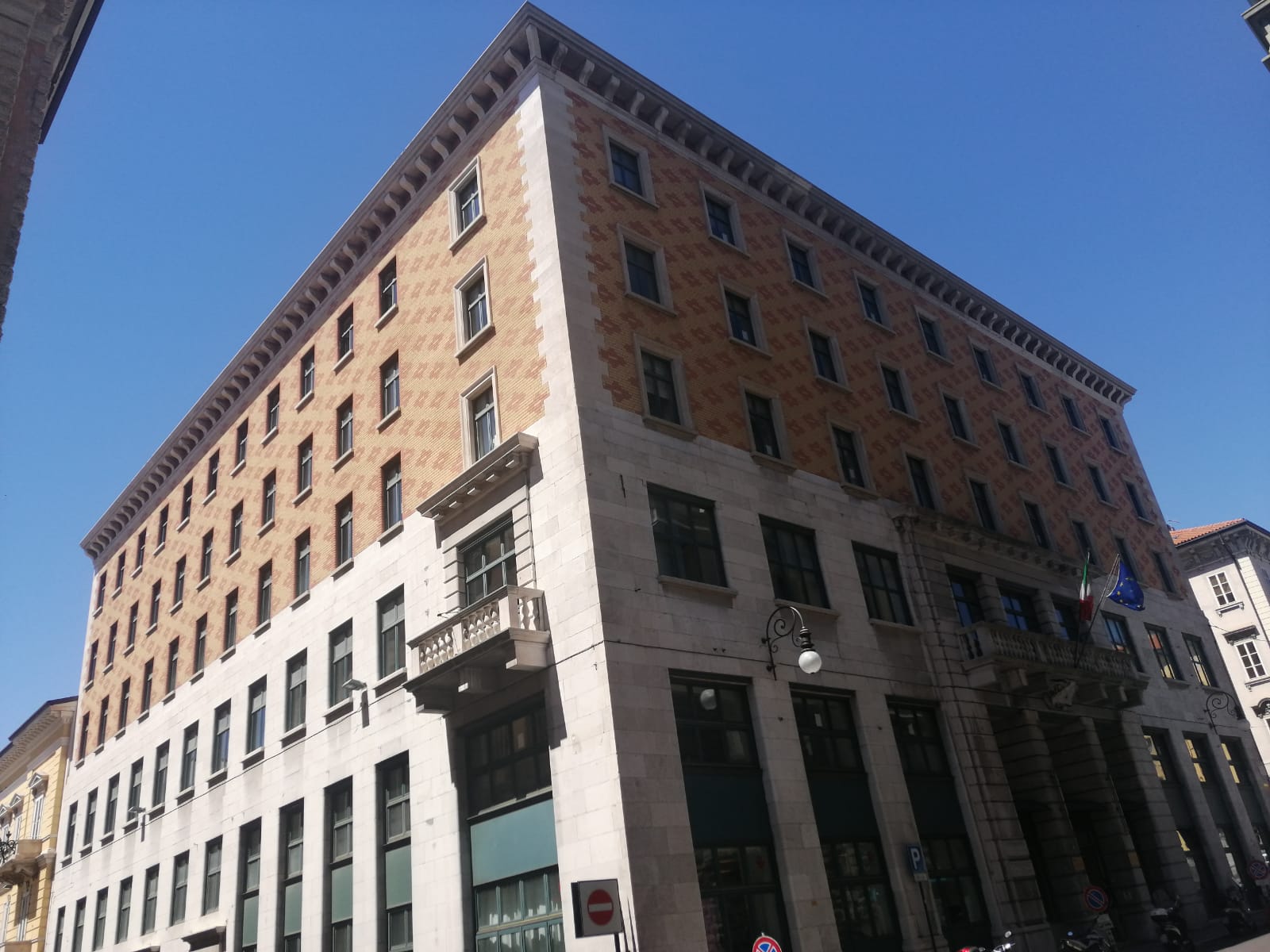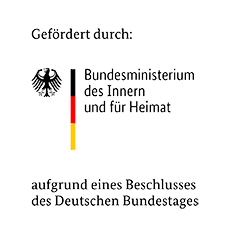
FUEN begrüsst die Rückgabe des Narodni Doms an die slowenische Gemeinschaft in Italien
11.07.2020
Am 13. Juli findet die symbolische Zeremonie der Rückgabe des Narodni Doms von Triest / Trst an die slowenische Gemeinschaft in Anwesenheit der italienischen und slowenischen Präsidenten Sergio Mattarella und Borut Pahor statt. Die feierliche Rückgabe des Gebäudes markiert den 100. Jahrestag der Brandstiftung durch die Faschisten und Nationalisten.
Das Gebäude wird der neu gegründeten Stiftung Narodni dom übertragen, die von führenden slowenischen Organisationen, der Slowenischen Kultur- und Wirtschaftsunion (SKGZ) und dem Rat der slowenischen Organisationen (SSO), ebenfalls Mitglied der FUEN, gegründet wurde. Bis zum endgültigen Auszug der Dolmetscherschule der Universität Triest, die derzeit Eigentümer des Gebäudes ist, könnte die Universität der slowenischen Minderheit bereits einige Räumlichkeiten im Erdgeschoss des Narodni dom zur Verfügung stellen. Der Prozess wird sich aber noch über einige Jahre hinziehen und erst dann abgeschlossen sein, wenn alle Maßnahmen erfolgreich umgesetzt wurden.
Vor der Hauptzeremonie anlässlich der Rückgabe des Narodni dom an die slowenische Gemeinschaft werden die Präsidenten Sloweniens und Italiens Kränze am Denkmal für die Helden von Bazovica sowie an der Gedenkstätte am Bazoviška fojba niederlegen. Die FUEN wird durch die Vizepräsidentin Dr. Angelika Mlinar bei der Zeremonie vertreten.
"Die Föderalistische Union Europäischer Nationalitäten begrüßt den symbolischen Akt der Rückgabe und betrachtet die Zeremonie, an der sowohl der italienische als auch der slowenische Präsident teilnehmen werden, als einen wichtigen Schritt zur Versöhnung und Annäherung zwischen den Gemeinschaften, der den europäischen Geist der heutigen Zeit voll und ganz widerspiegelt. Die FUEN hofft, dass dieser Geste des italienischen Staates gegenüber der slowenischen Minderheit eine anhaltende starke Unterstützung für die Minderheit folgen wird, da dies sowohl den Slowenen als auch den Italienern zugute kommen würde.“, erklärte Loránt Vincze, MdEP und Präsident der FUEN.
Der von Max Fabiani entworfene Narodni Dom wurde zwischen 1902-1904 erbaut. Von seiner Eröffnung im Jahr 1904 bis zu seinem Brand im Jahr 1920 war der Narodni Dom Ausdruck der sozialen, politischen, kulturellen und wirtschaftlichen Wiederbelebung der Slowenen von Triest / Trst. Zahlreiche slowenische und slawische Gesellschaften aus Triest/Trst zogen in den Dom ein, außerdem verfügte er über ein Theater, ein Restaurant, ein Café und ein Hotel. Am 13. Juli 1920 wurde auf das Gebäude von italienischen faschistischen und nationalistischen Gruppen im Rahmen eines Pogroms gegen slowenische Institutionen und Unternehmen in Triest / Trst ein Brandanschlag verübt. Das Gebäude musste daraufhin verkauft werden.
Die Forderungen nach der Rückgabe des Narodni Doms begannen unmittelbar nach der Befreiung von dem faschistischen Regime. Dennoch erwiesen sich die Bemühungen erst 2001 als erfolgreich, als das Schutzgesetz für die slowenische Minderheit die Rückgabe zu einer Verpflichtung Italiens machte. Obwohl das Gesetz bereits in Kraft war, erwies sich der Restitutionsprozess als langwierig und kompliziert.
ENGLISH:
FUEN welcomes the restitution of the Narodni Dom to the Slovene community in Italy
On July 13 the symbolic return ceremony of the Narodni Dom in Trieste / Trst to the Slovene community will take place in the presence of the Italian and Slovenian presidents, Sergio Mattarella and Borut Pahor. The ceremony of the restitution of the building marks the 100th anniversary of the arson by the fascists and nationalists.
The building will be assigned to the newly founded Foundation Narodni dom, established by leading Slovenian organisations, the Slovenian Cultural and Economic Union (SKGZ) and the Confederation of Slovenian Organizations (SSO), also member of FUEN. Pending the final transfer of the Interpreting School of Trieste University, which is the current owner of the building, the University could make some premises on the ground floor of the Narodni Dom available to the Slovenian minority. The process will last a few years and will only be completed if all the actions are completed successfully.
Before the main ceremony on the occasion of the return of Narodni dom to the Slovenes, the presidents of Slovenia and Italy will lay wreaths at the monument to the heroes of Bazovica and at the memorial at Bazoviška fojba. FUEN will be represented through the Vice-President Dr. Angelika Mlinar.
“The Federal Union of European Nationalities welcomes the symbolic act of the restitution and considers the ceremony in which both the Italian and Slovenian presidents will take part an important step towards reconciliation and rapprochement between the communities, which fully reflects the European spirit of the present times. The FUEN is hopeful that this gesture by the Italian state towards the Slovene minority will be followed by a continuous strong support for the minority, as it would benefit both Slovenes and Italians.”- Loránt Vincze, MEP and President of FUEN.
Designed by Max Fabiani, Narodni Dom was built between 1902-1904. From its opening in 1904 until its burning in 1920, Narodni Dom was an expression of the social, political, cultural and economic revival of the Slovenes of Trieste / Trst. Numerous Slovene and Slavic societies from Trieste / Trst moved into it, and it also had a theater, a restaurant, a café and a hotel. On July 13, 1920, it was attacked and burned by Italian fascist and nationalist groups as part of a pogrom against Slovene institutions and companies in Trieste / Trst. The building was then forced to be sold.
Demands for the return of the Narodni Dom began immediately after the liberation, but efforts were not successful until 2001, when the protection law for the Slovene minority made the restitution an obligation of Italy. Even with the law in place, its restitution process proved to be a long and complicated one.
SLOVENSKO:
FUEN pozdravlja vrnitev Narodnega doma slovenski skupnosti v Italiji
V pondeljek, 13. julija 2020 bo ob prisotnosti italijanskega in slovenskega predsednika Sergija Mattarelle in Boruta Pahorja simbolična slovesnost vrnitve Narodnega doma v Trstu slovenski skupnosti. Slovesnost obeležuje 100-letnico požiga stavbe s strani fašistov in nacionalistov.
Stavba bo tako dodeljena novoustanovljeni fundaciji Narodni dom, katere ustanoviteljici bosta obe krovni organizaciji, Slovenska kulturna in gospodarska zveza (SKGZ) in Svet slovenskih organizacij (SSO), ki je tudi članica FUEN-a. Do končnega prenosa lastništva stavbe, ki je trenutno v lasti tržaške univerze, bi slovenska skupnost od univerze lahkod dobila v uporabo nekaj prostorov v pritličju Narodnega doma. Postopek vračanja bo trajal nekaj let, dokončan pa bo le, če bodo vsi potrebni postopki uspešno izpeljani.
Pred osrednjo slovesnostjo ob vrnitvi Narodnega doma Slovencem bosta predsednika Slovenije in Italije skupaj položila venca k spomeniku bazoviškim junakom in k spominskemu obeležju pri Bazoviški fojbi. FUEN bo na slovesnosti zastopala podpredsednica Dr. Angelika Mlinar.
»Federalna Unija Evropskih Narodnih Skupnosti (FUEN) pozdravlja simbolično dejanje restitucije in meni, da je obisk italijanskega in slovenskega predsednika pomemben korak k spravi in zbliževanju obeh skupnosti, ter v popolnosti odraža evropskih duh sedanjosti. FUEN upa, da bo tej potezi italijanske države do slovenske manjšine sledila močna in zanesljiva podpora manjšini, saj bi to koristilo tako slovensko kot italijansko govorečim državljankam in državljanom.« - Loránt Vincze, Evropski poslanec in Predsednik FUEN-a.
Narodni dom je zasnoval znani arhitekt Max Fabiani, zgrajen pa je bil med letoma 1902-1904. Narodni dom je bil od svojega odprtja leta 1904 do požiga leta 1920 družbeni, politični, kulturni in gospodarski center tržaških Slovencev. Vanj so se preselila številna slovenska in slovanska društva iz Trsta, imela pa je tudi gledališče, restavracijo, kavarno in hotel. 13. julija 1920 so ga italijanske fašistične in nacionalistične skupine napadle in zažgale kot del pogroma nad slovenskimi institucijami in podjetji v Trstu. Stavbo so bili nato prisiljeni prodati.
Zahteve po vrnitvi Narodnega doma so se začele takoj po osvoboditvi, vendar prizadevanja niso bila uspešna do leta 2001, ko je zakon o zaščiti slovenske manjšine restitucijo navezal na Italijo. Tudi pri veljavnem zakonu se je postopek restitucije izkazal za dolgega in zapletenega.


